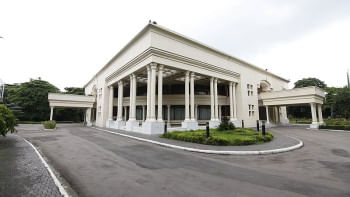US for improving worker safety
The US is continuing to press the Bangladesh government to fulfil a labour-related action plan designed to restore the country's eligibility for the Generalised System of Preferences (GSP), administration officials said on Monday.
Some progress has been made but more needs to be done, the US officials in Washington said in a conference call with reporters in advance of the first anniversary of the Rana Plaza collapse on April 24.
New labour laws have been promulgated but regulations are yet to be implemented, Bloomberg BNA reported, quoting unnamed officials. They also said the laws fall short of raising the labour standards in export processing zones to the national level. They said there have been some improvements in workplace safety measures and cited an increased number of inspectors and inspections.
During a meeting on April 28 in Dhaka, US officials will attempt to verify the number of inspectors that have been hired and press Bangladesh to ensure workers have the freedom of association and the right to bargain collectively.
In June last year, President Barack Obama suspended Bangladesh's tariff benefits under the GSP, a scheme that aims to promote economic growth in the developing world by providing preferential duty-free entry for up to 5,000 products. The programme benefits 126 designated countries and territories.
Obama cited as the basis for his decision the tragic deaths of workers in the Tazreen Fashions fire and the Rana Plaza collapse, as well as the inability of Bangladeshi workers to exercise their full labour rights.
In July 2013, the United States Trade Representative provided Bangladesh with an action plan on worker rights and safety that, if implemented, could provide a basis for the president to consider the reinstatement of GSP trade benefits
The GSP scheme lapsed at the end of July and only a small portion of Bangladesh's exports to the US are eligible for the programme because textiles are exempted.
One of the US officials said the removal of Bangladesh from GSP had a limited influence on its exports but did send a strong message.
Washington and Dhaka on November 25 signed the US-Bangladesh Trade and Investment Cooperation Forum Agreement (Ticfa), and meetings under the forum will take place in Dhaka on April 28.
A review of Bangladesh's GSP eligibility is under way, the official said, with a decision expected in the second half of June. If a reinstatement is recommended, it would be unlikely to happen while the programme has lapsed, he said.
"We had our first interim review of Bangladesh late last year, and in early January of this year we indicated to the Bangladesh government that while some progress had been achieved, there was some way to go. We would not be moving to reinstate benefits at that time.”
With details from Bloomberg BNA and PTI

 For all latest news, follow The Daily Star's Google News channel.
For all latest news, follow The Daily Star's Google News channel. 



Comments